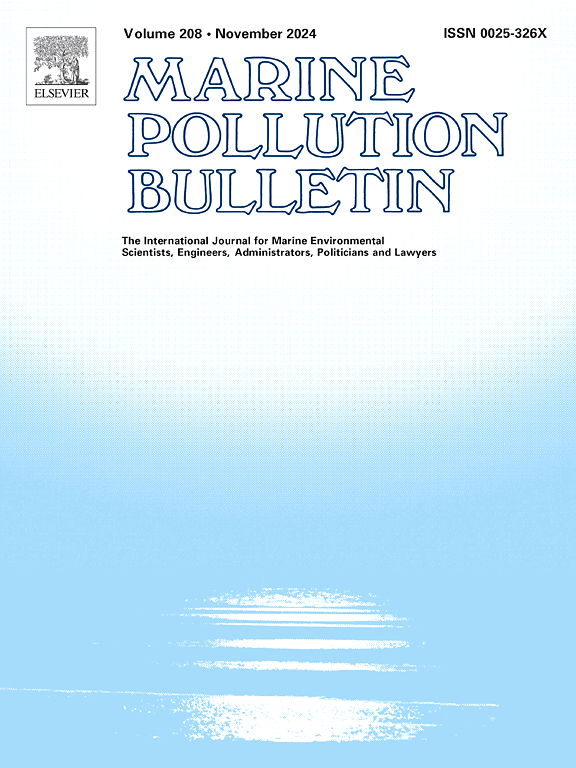气候变化背景下烟头洗脱液对Artemia franciscana的影响
IF 5.3
3区 环境科学与生态学
Q1 ENVIRONMENTAL SCIENCES
引用次数: 0
摘要
烟头是世界范围内的主要污染物,对环境构成了挑战,特别是在当前的气候危机中。因此,本研究考察了Artemia franciscana对吸烟(SCBs)和非吸烟(nSCBs)烟头洗脱液随温度升高的生物学反应。进行急性(0.188-4.0 CBs/L, 48 h)和亚慢性(0.03125-0.5 CBs/L, 7 d)试验,将nauplii暴露于两种温度下(25.0±1.0°C,指南;根据IUCN(2017年)和欧洲环境署(2023年)的预测,30.0±1.0°C。观察到高急性毒性:25.0°C时LC50 = 3.98 SCBs/L, LC50 = 0.94 nSCBs/L, 30.0°C时SCBs毒性增加(LC50 = 1.26 SCBs/L)。亚慢性暴露表明,温度升高通过扰乱乙酰胆碱酯酶(AChE)、过氧化氢酶(CAT)和谷胱甘肽s -转移酶(GSTs)活性,诱导氧化损伤(硫代巴比妥酸活性物质- TBARS)和影响能量代谢(乳酸脱氢酶- LDH)影响生物对CBs的生物反应。a . franciscana的生物学反应强调了通过理解在变暖的世界中这些生态毒理学影响来减轻CBs污染的重要性。本文章由计算机程序翻译,如有差异,请以英文原文为准。

Impact of cigarette butts elutriates on Artemia franciscana in a climate change context
Cigarette butts (CBs) are major worldwide pollutants, posing environmental challenges, especially in the current climate crisis. Hence, this study examined the biological responses of Artemia franciscana to smoked (SCBs) and non-smoked (nSCBs) cigarette butt elutriates with increased temperatures. Acute (0.188–4.0 CBs/L, 48 h) and sub-chronic (0.03125–0.5 CBs/L, 7 d) assays were performed, exposing nauplii to two temperatures (25.0 ± 1.0 °C, guideline; and 30.0 ± 1.0 °C, according to IUCN (2017) and European Environment Agency (2023) projections). High acute toxicity was observed: LC50 = 3.98 SCBs/L and an LC50 = 0.94 nSCBs/L at 25.0 °C, with increased toxicity for SCBs (LC50 = 1.26 SCBs/L) at 30.0 °C. The sub-chronic exposure showed that the temperature increase affected the organisms' biological responses to CBs by disturbing the activity of acetylcholinesterase (AChE) and the antioxidant enzymes catalase (CAT) and glutathione S-transferases (GSTs), inducing oxidative damage (thiobarbituric acid reactive substances – TBARS) and influencing energy metabolism (lactate dehydrogenase – LDH). A. franciscana's biological responses emphasize the importance of mitigating CBs pollution by understanding these ecotoxicological implications in a warming world.
求助全文
通过发布文献求助,成功后即可免费获取论文全文。
去求助
来源期刊

Marine pollution bulletin
环境科学-海洋与淡水生物学
CiteScore
10.20
自引率
15.50%
发文量
1077
审稿时长
68 days
期刊介绍:
Marine Pollution Bulletin is concerned with the rational use of maritime and marine resources in estuaries, the seas and oceans, as well as with documenting marine pollution and introducing new forms of measurement and analysis. A wide range of topics are discussed as news, comment, reviews and research reports, not only on effluent disposal and pollution control, but also on the management, economic aspects and protection of the marine environment in general.
 求助内容:
求助内容: 应助结果提醒方式:
应助结果提醒方式:


